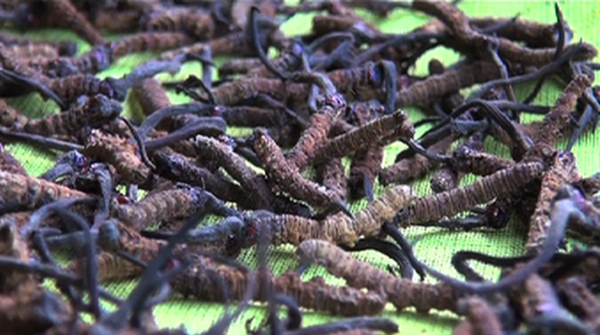 There will not be any Cordyceps auction this year anywhere in the country. However, the government has allowed the direct buying and selling of the fungus this year as well. Under this arrangement, buyers will have to meet and purchase the fungus directly from the Cordyceps collectors. This is being done to avoid gatherings amid the COVID-19 pandemic.
There will not be any Cordyceps auction this year anywhere in the country. However, the government has allowed the direct buying and selling of the fungus this year as well. Under this arrangement, buyers will have to meet and purchase the fungus directly from the Cordyceps collectors. This is being done to avoid gatherings amid the COVID-19 pandemic.
According to the Agricultural Marketing and Cooperatives Department under the Agriculture Ministry, 54 buyers have registered to export Cordyceps this year. The number has almost doubled from last year when only 28 people registered. But without auctions this year, some people are worried they will not get a fair price for their harvests. However, According to Yonten Gyamtsho, the Chief Marketing Officer of the Agricultural Marketing and Cooperatives Department, last year’s record show there isn’t much of a difference in prices between that of the auctions and direct buying and selling.
Under direct buying and selling, the Collectors can sell their harvest after paying a royalty. Some collectors in Bumthang who have already sold their harvests say the price is better this year compared to last year.
“Although the auction has been cancelled, a couple of exporters visited our village to buy Cordyceps and the price is also good compared to last year. The top quality Cordyceps fetched only around Nu 1.2 M last year. This year the price is around Nu 1.5 M a kilogram”, said Tashi, a Cordyceps Collector from Nangsiphel village in Chhoekhor Gewog.
Meanwhile, the Cordyceps yield is also declining each year. Some collectors say the harvest was the poorest this year.
Sonam Tenzin from Khangrab village in Tang Gewog says nowadays collectors can hardly get 20 to 30 pieces of Cordyceps in a day. A few years ago, collectors could get around 200 to 300 pieces of Cordyceps daily. Another collector, Tashi from Nangsiphel in Chhoekhor Gewog says the fungi used to grow in clusters in the past but now finding even two pieces growing alongside each other in the same area is rare. He thinks it could be because of excessive harvesting as the number of collectors is increasing annually.
Meanwhile, with the Cordyceps market becoming unpredictable due to the COVID pandemic, collectors in Bumthang are switching to agriculture and animal husbandry as the main source of their livelihoods.
Kipchu, Bumthang
Edited by Yeshi Gyaltshen












